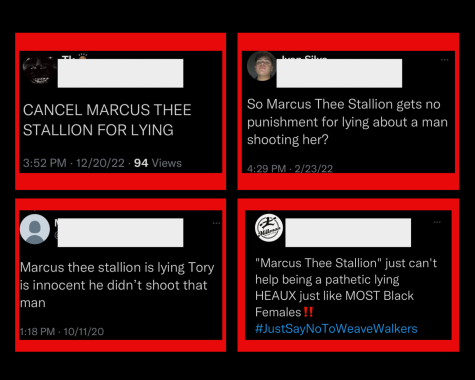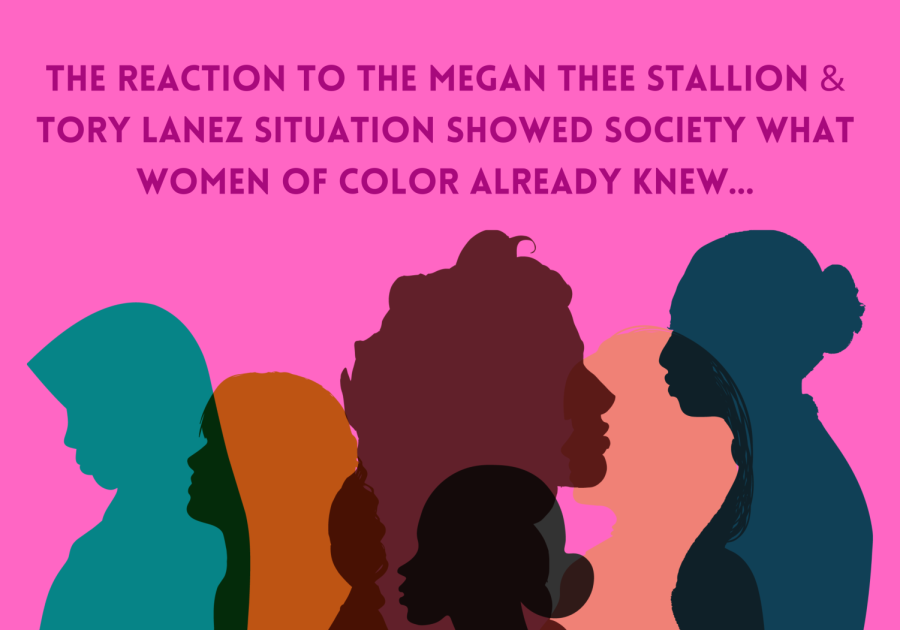The Reaction to the Megan Thee Stallion & Tory Lanez Situation Showed Society What Women of Color Already Knew
The backlash Megan faced and how her race and gender influenced it
February 20, 2023
Rapper Megan Thee Stallion, whose real name is Megan Pete, recently testified in court that she was shot and wounded by R&B singer/rapper Tory Lanez at a Hollywood Hills party on the 12th of July 2020. Ever since the news broke out, Megan has received all sorts of hate and scrutiny from male internet users, but what some individuals and might not think about when it comes to the backlash Megan is facing is that her race and gender plays a crucial role in it.
To start, hip-hop has proven to become one of the most popular music genres in the world, with roots grounded in African American and Latino American culture. However, the commercialization of hip hop has led to a focus on sales and marketing, often resulting in the promotion of harmful attitudes towards women, especially Black and brown women. According to research conducted by Jude Spencer of The Center School, approximately 22 percent to 37 percent of rap lyrics contain some level of misogyny and many male hip-hop fans tend to hold on to these ideologies presented to them and make it their own.
Sophomore Godric Rivera-Lopez stated, “I’ve heard many lyrics in rap songs basically degrading women, and though I’ve never shared those views, I’ve met a lot of other guys who are influenced by them.”
Upon the recent court case with Megan and Tory, men on the internet have resorted to calling Megan degrading names such as “Marcus Thee Stallion” and “Megan Thee Horse” to make fun of her tall stature. These degradations can be resorted back to the Sapphire Caricature, which is the stereotyping of black women as masculine, loud, stubborn, and overbearing, and has been around for hundreds of years and emphasized through television and film.

According to an anonymous senior, “I think seeing how Megan is treated on the internet shows people the type of comments that Black women get a lot. I can recall many instances just like this, in a variety of situations where a Black girl is called a man because someone didn’t like her.”
According to the Institute for Women’s Policy Research, Black women face higher rates of physical violence, psychological abuse and sexual violence than any other race and gender, and more than four in ten Black females experience abuse from an intimate partner during their lifetimes.
Another issue that contributes to the situation at hand is how Black and brown women have long faced a pervasive problem of not being believed in various contexts. In the criminal justice system, this issue results in a lack of justice for certain crimes committed against black females. The aforementioned Sapphire Caricature contributes to a distrust of black women in the criminal justice system and can discourage Black women from seeking help when they need it. The story “The Victim Who Became the Accused” by Rachel Aviv from the New York Times details an example of this, where Black female police officer Arica Waters had reported that a white male colleague had taken advantage of her sexually and found herself on trial. In addition, Black girls aged 18-19 were four times more likely to be imprisoned than their white counterparts and women of color are among the fastest growing populations in American prisons.
“I personally believe that there’s many examples of Black women not being believed, whether it’s in the regular court or the court of public opinion. I think this whole situation with Megan Thee Stallion is just bringing to light what I and my women of color friends already notice,” explained Junior Sacadi Powell.
This circumstance with Megan and Tory is one of many, but because it’s between two famous people in a booming industry it’s gaining more attention than usual. Society needs to focus on the reasons as to why these situations keep happening, and how we can teach others to prevent them.
Freshman Chanyce McIntosh claims, “I hope that, in the future, moments like this will stop or at least decrease, but for now it’s only a wish.”



